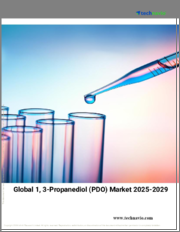
|
시장보고서
상품코드
1570983
1,3-프로판디올(PDO) 시장 : 현황 분석 및 예측(2024-2032)1,3-PROPANEDIOL (PDO) Market: Current Analysis and Forecast (2024-2032) |
||||||
1,3-프로판디올(PDO) 시장은 퍼스널케어, 자동차, 산업용 등 산업 전반에 걸쳐 다용도로 널리 사용되고 있어 급격한 성장이 예상됩니다. 화장품 및 퍼스널케어 업계에서 PDO는 보습 능력과 석유계 글리콜의 대체품으로 인정받고 있습니다. 또한 생분해성 플라스틱과 고성능 폴리머에 적용하는 것은 특히 전 세계적으로 친환경 제품에 대한 수요가 증가함에 따라 또 다른 기회를 제공합니다. 보다 저렴한 생명공학 생산 플랫폼의 출현과 바이오 생체 분자 기업과 핵심 부문과의 생산적인 전략적 제휴는 시장 접근성을 향상시킬 것으로 기대됩니다.
제품에 따라 1,3-프로판디올(PDO) 시장은 재래식 시장과 바이오 시장으로 나뉩니다. 바이오 분야는 1,3-프로판디올(PDO) 시장에서 큰 비중을 차지하고 있습니다. 바이오 PDO는 기존의 석유 기반 PDO와 달리 옥수수 설탕과 같은 자원을 발효시켜 만들어져 환경 친화적입니다. 기업인과 투자자들이 재생 가능한 원료 사용, 기후에 미치는 영향에 따른 탄소 배출량 감소 등 보다 지속 가능한 개발에 중점을 두기 시작하면서 업계는 점차 바이오 PDO를 채택하기 시작했습니다. 또한 바이오 PDO는 화장품, 섬유 산업, 바이오 제품의 새로운 트렌드에 따라 퍼스널케어 제품에도 널리 사용되고 있습니다. 또한 생분해성 폴리머인 PTT(폴리트리메틸렌테레프탈레이트)를 제조하는 원료로도 활용되고 있습니다.
1,3-프로판디올(PDO) 시장은 용도별로 폴리트리메틸렌 테레프탈레이트(PTT), 화장품, 퍼스널케어 및 청소 제품, 폴리우레탄, 기타로 구분되며, PTT 분야가 시장에서 큰 비중을 차지하고 있습니다. 이는 지속 가능한 바이오 폴리머가 섬유 산업과 포장 산업에서 증가하는 추세에 있기 때문입니다. 생분해성 폴리머의 일종인 PTT는 다른 폴리머에 비해 탄성 회복성, 탄력성, 방오성 등의 측면에서 높은 성능을 가지고 있어 섬유, 카펫, 의류에 사용하는 것이 바람직합니다. 환경 보호에 대한 인식과 친환경 소재의 사용이 증가함에 따라 PTT의 사용이 증가하여 PTT의 원료 중 하나인 PDO의 전반적인 수요가 증가하고 있습니다. 또한 순환 경제에 대한 관심 증가와 제조의 풍부한 솔루션은 PTT에 대한 수요를 증가시켜 회사는 PDO 시장에서 선두를 달리고 있습니다.
1,3-프로판디올(PDO) 시장 도입에 대한 이해를 돕기 위해 북미(미국, 캐나다, 기타 북미), 유럽(독일, 영국, 프랑스, 스페인, 이탈리아, 기타 유럽), 아시아태평양(중국, 인도, 일본, 기타 아시아태평양), 기타 지역에서의 세계 입지를 기준으로 분석되었습니다. 북미는 1,3-프로판디올(PDO) 시장 확대에 크게 기여하고 있습니다. 이러한 우위의 주요 요인은 PDO 제조업체와의 거래 가능성, 첨단 기술 구조 및 바이오 제품으로의 전환입니다. 특히 미국은 비용 효율성과 자원 효율성을 높이는 바이오 발효를 포함한 PDO 생산 공정 개발에서 선두를 달리고 있습니다. 또한 지속 가능한 폴리머 생산에 사용되는 PTT에 대한 안정적인 수요가 있으며, 생산 공정에 PDO가 필요한 PTT는 의류, 자동차 및 포장 산업으로 유명한 북미에서 PDO 채택을 촉진하는 또 다른 요인은 이 지역이 이산화탄소 배출량 감소와 생산의 녹색화를 강조하고 있다는 점입니다. 입니다.
시장에 진출한 주요 기업으로는 DuPont, Metabolic Explorer, Zhangjiagang Glory Biomaterial Co. Merck KGaA, Tokyo Chemical Industry Co., Ltd, Otto Chemie Pvt Ltd, Primient Covation LLC, Haihang Industry 등이 있습니다.
목차
제1장 시장 서론
- 시장의 정의
- 주요 목적
- 이해관계자
- 제한 사항
제2장 조사 방법 또는 전제조건
- 조사 과정
- 조사 방법
- 응답자 개요
제3장 주요 요약
- 업계 요약
- 부문별 전망
- 시장 성장력
- 지역 전망
제4장 시장 역학
- 성장 촉진요인
- 기회
- 성장 억제요인
- 동향
- PESTEL 분석
- 수요측 분석
- 공급측 분석
- 인수합병(M&A)
- 투자 시나리오
- 업계 인사이트 : 대형 스타트업 기업과 그 독자적인 전략
제5장 가격 분석
- 지역별 가격 분석
- 가격에 영향을 미치는 요인
제6장 세계의 1,3-프로판디올(PDO) 시장 매출, 2022-2032년
제7장 시장 인사이트 : 제품별
- 기존
- 바이오
제8장 시장 인사이트 : 용도별
- 폴리트리메틸렌 테레프탈레이트(PTT)
- 화장품
- 퍼스널케어 및 클리닝 제품
- 폴리우레탄
- 기타
제9장 시장 인사이트 : 지역별
- 북미
- 미국
- 캐나다
- 기타 북미
- 유럽
- 독일
- 영국
- 프랑스
- 스페인
- 이탈리아
- 기타 유럽
- 아시아태평양
- 중국
- 일본
- 인도
- 기타 아시아태평양
- 세계 기타 지역
제10장 밸류체인 분석
- 한계분석
- 시장 진출기업 리스트
제11장 경쟁 구도
- 경쟁 대시보드
- 경쟁 시장 포지셔닝 분석
- Porter의 Five Forces 분석
제12장 기업 개요
- DuPont
- Metabolic Explorer
- Zhangjiagang Glory Biomaterial Co., Ltd.
- Zouping Mingxing Chemical Co., Ltd.
- Shell Chemicals LP
- Merck KGaA
- Tokyo Chemical Industry Co., Ltd.
- Otto Chemie Pvt Ltd.
- Primient Covation LLC
- Haihang Industry
제13장 두자어와 전제조건
제14장 부록
LSH 24.10.251,3-Propanediol (PDO) is an important chemical intermediate widely employed as a chemical precursor for polymers, resins, and cosmetics. It has emerged in recent years because of its uses in bio-based material especially in polytrimethylene terephthalate, it has applications in textiles and packaging. The increasing preference for green products has been instrumental in the transition from traditional petrochemical PDO to bio-based PDO obtained from renewable feedstock such as corn glucose.
The PDO market is expected to grow rapidly because of its versatile and widespread use across industries, including personal care and automotive and industrial applications. For the cosmetics and personal care industry, PDO is recognized for its moisturizing abilities and function as a bent for petroleum-based glycols. Furthermore, application in biodegradable plastics and high-performance polymers presents other opportunities particularly due to the increasing demand for eco-friendly products across the globe. The advent of cheaper biotechnological production platforms together with productive strategic alliances between bio-based biomolecular firms and critical sectors are expected to improve market access.
Based on the product, the 1,3-propanediol (PDO) market is bifurcated into conventional and bio-based. The bio-based segment caters to a significant share of the 1,3-propanediol (PDO) market. Bio-based PDO is made through the fermentation of resources such as corn sugar making it environmentally friendly, unlike the conventional, petroleum-based PDO. When business people and investors start emphasizing more sustainable development use of renewable raw materials and reduced carbon emissions due to effects on the climate, industries are therefore slowly leaning towards adopting bio-based PDO. In addition, bio-based PDO has widespread use in cosmetic and textile industries, and personal care products because of the emerging trend of bio-based products. It also serves as an ingredient in manufacturing PTT or polytrimethylene terephthalate which is a biodegradable polymer.
Based on application, the 1,3-propanediol (PDO) market is segmented into Polytrimethylene Terephthalate (PTT), Cosmetics, Personal Care and Cleaning Products, Polyurethane, and Others. The PTT segment catered to a significant share of the market. This is because sustainable and bio-based polymers are a rising trend in the textile and packaging industries. PTT, a type of biodegradable polymer, is preferable for use in fibers, carpets, and apparel because PTT has higher performances in terms of elastic recovery, resilience, and stain resistance compared to other polymers. Environmental conservation consciousness and increasing use of environmentally friendly materials have led to increased use of PTT hence increasing the overall demand for PDO which is one of the ingredients of PTT. Also, the increasing concern towards circular economies and abundant solutions in manufacturing has increased the demand for PTT, which positions the company at the top of the PDO market.
For a better understanding of the market adoption of 1,3-Propanediol (PDO), the market is analyzed based on its worldwide presence in countries such as North America (U.S., Canada, and the Rest of North America), Europe (Germany, UK, France, Spain, Italy, Rest of Europe), Asia-Pacific (China, India, Japan, and Rest of Asia-Pacific), Rest of World. North America has significantly contributed to the expansion of the 1,3-propanediol (PDO) market. The key factors for this dominance are availability with PDO manufacturers, advanced technological structure, and a shift towards bio-based products. The United States has especially been at the forefront of the development of the PDO production processes including the bio-based fermentation that enhances cost and resource efficiency. Also, there is a steady demand for PTT, which is used in producing sustainable polymers and which requires PDO in the manufacturing process, is famous within North America in the clothing, automotive, and packaging industries. Another factor that has pushed the adoption of PDO is the region's emphasis on cutting back on carbon emissions and going green in production.
Some of the major players operating in the market include DuPont, Metabolic Explorer, Zhangjiagang Glory Biomaterial Co., Ltd., Zouping Mingxing Chemical Co., Ltd., Shell Chemicals LP, Merck KGaA, Tokyo Chemical Industry Co., Ltd., Otto Chemie Pvt Ltd., Primient Covation LLC, and Haihang Industry.
TABLE OF CONTENTS
1.MARKET INTRODUCTION
- 1.1. Market Definitions
- 1.2. Main Objective
- 1.3. Stakeholders
- 1.4. Limitation
2.RESEARCH METHODOLOGY OR ASSUMPTION
- 2.1. Research Process of the 1,3-Propanediol (PDO) Market
- 2.2. Research Methodology of the 1,3-Propanediol (PDO) Market
- 2.3. Respondent Profile
3.EXECUTIVE SUMMARY
- 3.1. Industry Synopsis
- 3.2. Segmental Outlook
- 3.2.1. Market Growth Intensity
- 3.3. Regional Outlook
4.MARKET DYNAMICS
- 4.1. Drivers
- 4.2. Opportunity
- 4.3. Restraints
- 4.4. Trends
- 4.5. PESTEL Analysis
- 4.6. Demand Side Analysis
- 4.7. Supply Side Analysis
- 4.7.1. Merger & Acquisition
- 4.7.2. Investment Scenario
- 4.7.3. Industry Insights: Leading Startups and Their Unique Strategies
5.PRICING ANALYSIS
- 5.1. Regional Pricing Analysis
- 5.2. Price Influencing Factors
6.GLOBAL 1,3-PROPANEDIOL (PDO) MARKET REVENUE (USD MN), 2022-2032F
7.MARKET INSIGHTS BY PRODUCT
- 7.1. Conventional
- 7.2. Bio-based
8.MARKET INSIGHTS BY APPLICATION
- 8.1. Polytrimethylene Terephthalate (PTT)
- 8.2. Cosmetics
- 8.3. Personal Care and Cleaning Products
- 8.4. Polyurethane
- 8.5. Others
9.MARKET INSIGHTS BY REGION
- 9.1. North America
- 9.1.1. U.S.
- 9.1.2. Canada
- 9.1.3. Rest of North America
- 9.2. Europe
- 9.2.1. Germany
- 9.2.2. UK
- 9.2.3. France
- 9.2.4. Spain
- 9.2.5. Italy
- 9.2.6. Rest of Europe
- 9.3. Asia-Pacific
- 9.3.1. China
- 9.3.2. Japan
- 9.3.3. India
- 9.3.4. Rest of Asia-Pacific
- 9.4. Rest of World
10.VALUE CHAIN ANALYSIS
- 10.1. Marginal Analysis
- 10.2. List of Market Participants
11.COMPETITIVE LANDSCAPE
- 11.1. Competition Dashboard
- 11.2. Competitor Market Positioning Analysis
- 11.3. Porter Five Forces Analysis
12.COMPANY PROFILED
- 12.1. DuPont
- 12.1.1. Company Overview
- 12.1.2. Key Financials
- 12.1.3. SWOT Analysis
- 12.1.4. Product Portfolio
- 12.1.5. Recent Developments
- 12.2. Metabolic Explorer
- 12.3. Zhangjiagang Glory Biomaterial Co., Ltd.
- 12.4. Zouping Mingxing Chemical Co., Ltd.
- 12.5. Shell Chemicals LP
- 12.6. Merck KGaA
- 12.7. Tokyo Chemical Industry Co., Ltd.
- 12.8. Otto Chemie Pvt Ltd.
- 12.9. Primient Covation LLC
- 12.10. Haihang Industry


















